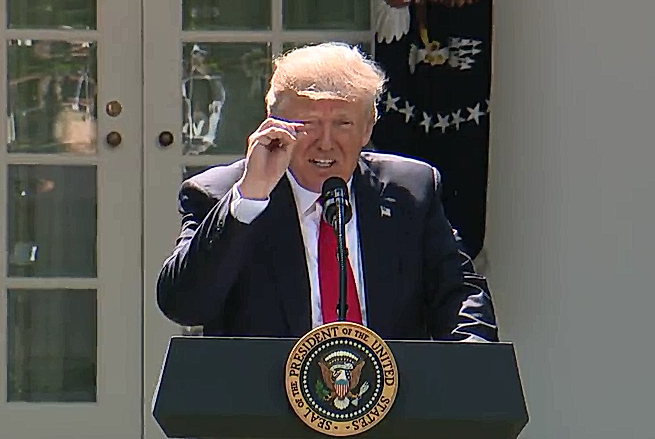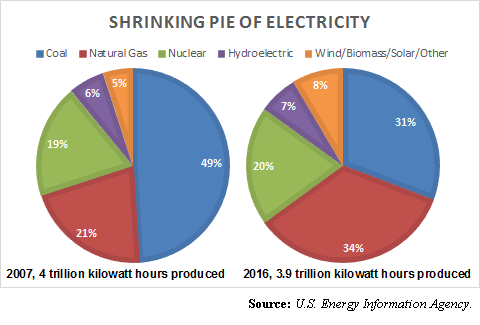President Donald Trump did the right thing. He exited the Paris climate accords. And Environmental Protection Agency (EPA) Administrator Scott Pruitt has followed through on that promise, announcing the Trump administration’s intent to rescind the new and existing coal power plant rules issued under Obama Clean Power Plan.
It’s a good idea. Since the former Obama administration began its war on coal in 2009 — beginning with the Carbon Endangerment Finding — coal as a percentage of the electrical grid has declined from 49 percent in 2007 to 31 percent in 2016, according to the Energy Information Agency (EIA). Natural gas now surpasses coal at 34 percent as a result.
With data as of 2016, 374 coal-burning power plants in 37 states were closing due to the EPA regulations, according to Americaspower.org. The states hardest hit by these plant closing include Ohio, Pennsylvania, and Michigan, which proved critical to President Donald Trump’s electoral college victory last November.
Largely a result of the coal plant closures, overall electricity generation in the U.S. has dropped from 4.005 trillion kWh in 2007 to 3.92 trillion kWh in 2016, while end use has only decreased from 3.89 trillion kWh to just 3.853 trillion kWh, with just 67 billion kWh of spare capacity. That’s not enough. We need coal.
Again, the Trump EPA has the right idea. But to be a long-term solution, Congress needs to do its part and revise the Clean Air Act to prevent this from ever happening again. Not that Congress ever allowed the Clean Air Act to regulate carbon. That was the Supreme Court in 2007, with the infamous Massachusetts v. EPA decision. Still, it is Congress that can fix it, by explicitly excluding the possibility of regulating carbon emissions as pollutants.
Otherwise, the next time the Democrats win the White House, a future president can just come back and reinstate the new and existing power plant rules. And then we can go back and forth, rescinding the rules, reinstating the rules.
Why would anybody invest in a new coal power plant under those circumstances, if the investment can just be eviscerated every four to eight years?
To create economic certainty, Congress must look toward policies that incentivize long-term capital investments like power plants and bolstering the electrical grid that will help create real jobs in the U.S., giving a boost to manufacturing and other industrial sectors.
The same can be said for tax reform. What good are temporary tax cuts? Why make an investment that the law will just take back in a few years?
When you break it down, not having a stable rule of law — indeed, having one that punishes entire sectors of the economy — is a death knell for the economy. In that context, it is little wonder the Obama economy was so lackluster, being the first administration unable to top 3 percent growth in a single year.
Since when do the American people have to take a backseat to regulators and the radical environmental lobby?
To get back on track, Congress needs to inject certainty back into the mix. It should be a bipartisan issue. Unfortunately, to get it done in the current environment, a stand-alone bill stands almost no chance in the Senate with its 60-vote threshold for passage.
Therefore, Congress should look to permanently defund these types of regulations in the upcoming omnibus spending bill that will be completed in December. And then just make it a point to reup the defund every year after that until a Senatorial supermajority can be crafted to get 60 votes or the legislative filibuster is simply eliminated.
The alternative is for dueling Democrat and Republican administrations to play whack-a-mole, adding and taking away job-killing regulations like the Clean Power Plan — wrecking the economy in the process. A stable rule of law that favors economic growth and job creation can fix that, but requires a bipartisan growth consensus that sadly is nowhere to be found.
Robert Romano is the Vice President of Public Policy at Americans for Limited Government.









